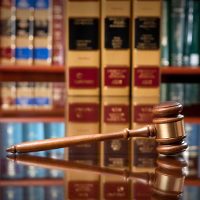 Audible has now filed its response to the publishers’ request for a preliminary injunction—twice. It filed the exact same brief to argue that it shouldn’t be preliminarily enjoined (Dkt. 34) and to argue that the complaint should be dismissed for failure to state a claim (Dkt. Read more
Audible has now filed its response to the publishers’ request for a preliminary injunction—twice. It filed the exact same brief to argue that it shouldn’t be preliminarily enjoined (Dkt. 34) and to argue that the complaint should be dismissed for failure to state a claim (Dkt. Read more
Blog
Audible’s Planned Caption Service is Not Fair Use
 Late last month, a group of publishers filed a complaint against Audible in the Southern District of New York asking the court to enjoin the audiobook distributor’s launch of a new audio-to-text transcription service. Although Audible has yet to file a response, a statement from the company—a subsidiary of Amazon since 2008—hints at a fair use defense based on the service’s supposed educational purpose. Read more
Late last month, a group of publishers filed a complaint against Audible in the Southern District of New York asking the court to enjoin the audiobook distributor’s launch of a new audio-to-text transcription service. Although Audible has yet to file a response, a statement from the company—a subsidiary of Amazon since 2008—hints at a fair use defense based on the service’s supposed educational purpose. Read more
Publishers v. Audible: VCRs and DVRs to the Rescue?
 On August 23, a group of publishers, including Penguin Random House, HarperCollins, and Simon & Schuster, sued Audible for copyright infringement. Audible, which is a subsidiary of Amazon, sells and produces audiobooks, and it planned to launch a new speech-to-text feature on September 10. Read more
On August 23, a group of publishers, including Penguin Random House, HarperCollins, and Simon & Schuster, sued Audible for copyright infringement. Audible, which is a subsidiary of Amazon, sells and produces audiobooks, and it planned to launch a new speech-to-text feature on September 10. Read more
George Mason University’s Antonin Scalia Law School Launches Innovation Law Clinic
 Scalia Law Will Serve Emerging Tech Sector in the DMV
Scalia Law Will Serve Emerging Tech Sector in the DMV
George Mason University’s Antonin Scalia Law School today announced the launch of its new Innovation Law Clinic to support the emerging, dynamic tech sector in the DMV (DC, MD, No VA). Read more
CPIP Roundup – August 29, 2019
Greetings from CPIP Executive Director Sean O’Connor

With a new academic year beginning at Antonin Scalia Law School, the CPIP team continues to build on a productive summer of scholarship, events, and more. Our WIPO-CPIP Summer School on Intellectual Property this past June boasted 70 students from 30 countries for a two-week crash course on the law and policy of IP in order to help advance their careers. Read more
New York Times Recycles Discredited Positions on Government Patent Rights over Pharmaceuticals
The New York Times is at it again. A year after its Editorial Board promoted flawed research on government rights to patented drugs as part of a price control plan, the Board floated the idea again, together with misinformation about the Bayh-Dole Act. Read more
“No Combination Drug Patents Act” Stalls, but Threats to Innovation Remain
 By Kevin Madigan & Sean O’Connor
By Kevin Madigan & Sean O’Connor
This week, the Senate Judiciary Committee was to mark up a bill limiting patent eligibility for combination drug patents—new forms, uses, and administrations of FDA approved medicines. While the impetus was to curb so-called “evergreening” of drug patents, the effect would have been to stifle life-saving therapeutic innovations. Read more
CPIP Roundup – May 23, 2019
Sean O’Connor Joins George Mason University’s Scalia Law Faculty

O’Connor will lead the Center for the Protection of Intellectual Property and expand innovation and entrepreneurship programs.
Professor Sean O’Connor, noted innovation law scholar, is joining George Mason University’s Scalia Law faculty as a tenured full professor and Executive Director of the Center for Protection of Intellectual Property (CPIP). Read more
Sean O’Connor Joins George Mason University’s Scalia Law Faculty
 O’Connor will lead the Center for the Protection of Intellectual Property and expand innovation and entrepreneurship programs.
O’Connor will lead the Center for the Protection of Intellectual Property and expand innovation and entrepreneurship programs.
Professor Sean O’Connor, noted innovation law scholar, is joining George Mason University’s Scalia Law faculty as a tenured full professor and Executive Director of the Center for Protection of Intellectual Property (CPIP). Read more
Twenty Years Later, DMCA More Broken Than Ever
 With Section 512 of the DMCA, Congress sought to “preserve[] strong incentives for service providers and copyright owners to cooperate to detect and deal with copyright infringements that take place in the digital networked environment.”[1] Given the symbiotic relationship between copyright owners and service providers, Congress meant to establish an online ecosystem where both would take on the benefits and burdens of policing copyright infringement. Read more
With Section 512 of the DMCA, Congress sought to “preserve[] strong incentives for service providers and copyright owners to cooperate to detect and deal with copyright infringements that take place in the digital networked environment.”[1] Given the symbiotic relationship between copyright owners and service providers, Congress meant to establish an online ecosystem where both would take on the benefits and burdens of policing copyright infringement. Read more

